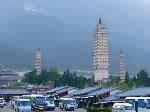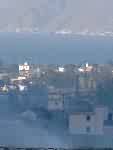- Getting around Lijiang. Dont stay in the Old Towns more than 2 days, there is nothing to do. KRISS Oct 9, 2013 05:46
- 2013 Beijing Temple Fair BENNYLAU Feb 26, 2013 03:29
- Malaysian traveling from KUL - LAX vis Shanghai PVG ZATI_DY Jan 3, 2013 20:15
The Backpackers of Dali
- Views: 5011
- |Vote: 0 0
- |Add to Favorites
- |Recommend to Friends
The Question of Travel
TRAVEL TIP: The bus to the Ancient City leaves from the opposite side of the road from the front door of the bus station in Xiaguan - take route 4.
There's supposed to be a difference between a tourist and a traveller. Essentially, the traveller is thought to be the more romantic of the two, seeking a far deeper knowledge and involvement in the places travelled to - but that's not necessarily the case. Tourists, with their in-depth guide books and well-informed tour guides frequently have a far better low-down on the details than the typical traveller, who may have just gotten off the train on a whim with no idea of where she or he is. Perhaps the character Port Moresby played by John Malkovich in "The Sheltering Sky" put it best when he said, the difference between a tourist and a traveller is that the traveller is never sure that he will return home.
So what's a backpacker then? Often, they're tourists who think that they're travellers. That wasn't always the case - ten years ago, they were louts with money and a lot of time to kill, but who had a passion for the sport as if travel was a religion. These days the backpack, long shorts and sandals have become a uniform, and the heavy guidebooks carried like bibles don't leave anything to chance anymore. It's possible to travel in 5 different countries and always bump into the same people, because most backpackers don't go outside the lines.
In China, things are a bit harder for this class of 'luxury' backpacker, because the country is developing and changing so fast that the books are often totally wrong. But China is certainly waking up to this industry of travellers who often spend more on a Western breakfast than they'd be prepared to pay for a dorm bed. Youth hostels have sprung up in many major cities over the last few years, foreigner-oriented bars and restaurants serving banana pancakes are opening everywhere, and the backpackers themselves are starting to venture into such previously lesser-visited areas as Dongbei, Xinjiang and Anhui.
Yunnan has been a growing favourite for a long time amongst backpackers, partly because of its proximity to South East Asia, where the tourism industry has been highly developed since GI's in the American/Vietnam war started hitting Thailand's Pattaya beaches for R&R. It's also China's most ethnically diverse province, with many of the country's ethnic minorities represented there - and that ensures that Yunnan is culturally varied and colourful.
I was in Kunming, Yunnan's capital, and had just one extra day to go travelling in the province, and so I chose to see Dali. It's half a day by bus from Kunming and is highly recommended by all the travel books and websites I'd looked at when researching the area. Dali is most well known for three things - firstly, the amount of marble quarried from the region is so voluminous that the Chinese word for marble is 'Dali Stone'. Secondly, Dali's original city area is extremely well preserved, a walled city that maintains the character of an ancient Chinese town. Thirdly, and most importantly, Dali is famous for its Three Pagodas Temple behind the old city area. Restaurants all over China hang a mural of the three splendid white towers standing loftily above a great lake and old temple in the wilderness. I'd often admired these posters that seemed to crop up everywhere I ordered a noodle soup, and have long since held an ambition to see the towers for myself.
I set off in the very early morning from Kunming. Said to be the city of eternal Spring, the outskirts of Kunming show marked effects of rapid development, and it took a while before the overturned dirt gave way to the Yunnan farmlands. It was a hot day, but mild in comparison with nearby Vietnam thanks to the height of the land - head further Northwest and you're halfway up the Himalayan Plateau. I enjoyed the sunshine along with the other passengers, amongst them a surprising amount of backpackers. The couple in front of me were chatting about the number of cities in India they'd visited and whether or not Dali was likely to have the Internet. Outside, the light fell upon a thousand prospering farms.
Just a few hours later, we arrived in Dali at the long distance bus terminus, situated in the middle of the main developed district in Dali, Xiaguan. Just as I was leaving the bus, I was asked to translate for a very frustrated couple from Britain - they were quite angered to see that the buildings around them were not in traditional Chinese style and were loudly insisting that the bus driver take them to Dali. I explained to them that the old city is a half hour bus ride away, and the girl asked me to explain to the bus driver that they'd paid to go to Dali, not Xiaguan. The driver looked at me helplessly and I assisted the couple in finding a public bus that went straight there for one yuan. Travellers should be well advised that no matter how good your preparation is, every day in China holds a surprise, and if you can take that on the chin, it's wonderful that way.
I stayed in Xiaguan - which is, by the way, still Dali - for a while exploring. There's not a lot to see, but it's a pleasant city, and the silver pearl-shaped monument opposite the railway station - which only has trains that go to Kunming - is worth a look. After a short while, I found a bus to the old city and boarded, bound for Dali's ancient past.
Searching for Something Genuinely Old
Dali, I discovered, is most pleasant in the rural areas. The city is situated near a great lake, and if you look out towards it you'll see clusters of old white houses on the lake's shore stretching out in groups of close knit farming communities - and on the opposite side of the lake in the distance, even more isolated communities at the shoreline in the shadow of great, untouched grassy mountains. Dali in these parts is clean, spacious, and genuinely carries something of the quality of a bygone era.
I soon arrived in the old city, and was initially greatly impressed. My bus turned into the main streets, which were set in grey marble, and each roadside had cut into it a small stream trickling over a bed of pebbles and crossed by small bridges. The houses themselves were faced in whitewashed marble walls, and the doors and windows were fitted in red criss-crossing wood panellings. I was losing the sunshine, so I decided to take the short walk from the West Gate directly to the Three Pagoda Temple to make sure I could photograph them before the sun went down. The air was swept in dust clouds owing to the amount of marble being cut in roadside yards.
You could say that the complex looked nothing like the photographs. The temple is enclosed in a great red wall that costs 51 yuan to enter, and it is swarming with some of China's most persistent merchants. I could see the towers stretching towards the sky like great white fingers from within their prison, and I remembered the posters I'd seen of their less claustrophobic days. Standing from a distance, I could capture images of the majority of the towers over the wall with the great mountains behind them, and so I did just that, as the setting sun made cold beams down between the peaks.
Back in the old city, the streets were congested with local Chinese tourists and a huge number of backpackers. I assumed that recent editions of the guide books have started giving Dali highly favourable reviews, and I watched the road-weary sunburnt Europeans wandering the ancient streets soaking in the old Chinese atmosphere and haggling for plastic beads and Three Pagoda Temple T-shirts. Han Chinese in Bai minority costume charged five yuan to pose with tourists for photographs. I had to admit that I found the city altogether too overdecorated, and I wasn't terribly reluctant to take the bus back to Xiaguan.
There are those who claim that tourists eventually destroy their own industry, and that the world's greatest attractions are gradually becoming plasticised and Disneyised. I've never entirely agreed with this, as I have never regarded any town or city as being sacred enough to prevent development in any industry, even at the cost of change. Things change all the time for many reasons, and tourism does bring money and jobs to remote areas. But I do feel that backpackers, travellers and tourists alike should never hold any illusions about what they wish to travel to see. China has something for every class of foreign visitor, and there's plenty for everyone. The ancient China that used to be found in Dali's Old City is now gone, but if you look carefully out towards the shores of the lake, you'll see something far older and much more genuine... just don't tell anyone...





 Copyright © 1998-2026 All rights reserved.
Copyright © 1998-2026 All rights reserved.
1.
Jun 25, 2009 09:01 Reply
ANAMARIA said:
Almost gets you a lil bit down specially when your planning to go there in a couple of weeks, at least i red it
2.
May 17, 2008 11:33 Reply
VANESSACYZ said:
this is such a spot-on description of dali(: i love the old dali city, ive been hooked since my first visit 3 years ago..and i go there every now and then just to get away from the pollution in the city.
Its major attraction? hehe you somehow managed to leave my favorite part out..those bai minority ladies and their wonderful trade (: goes well with the good spicy food the town offers!
3.
Jun 28, 2005 17:17 Reply
MERMAID said:
It is a blessing to read such nice words though there is a sense of loneliness.
I enjoy that phrase " a travel is never sure if he will return home." Life is one way trip-we never know when we will leave for another world. So enjoy this world as much as possible!